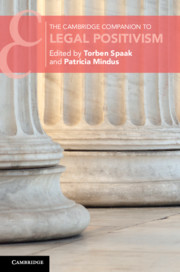Book contents
- The Cambridge Companion to Legal Positivism
- Cambridge Companions to Law
- The Cambridge Companion to Legal Positivism
- Copyright page
- Contents
- Figures
- Contributors
- Acknowledgements
- 1 Introduction
- Part I Fundamentals
- 2 Positivism, Realism and Sources of Law
- 3 Normative Legal Positivism
- 4 Legal Positivism as a Realist Theory of Law
- Part II History
- Part III Central Figures
- Part IV Main Tenets
- Part V Normativity and Values
- Part VI Critique
- Index
- References
2 - Positivism, Realism and Sources of Law
from Part I - Fundamentals
Published online by Cambridge University Press: 21 January 2021
- The Cambridge Companion to Legal Positivism
- Cambridge Companions to Law
- The Cambridge Companion to Legal Positivism
- Copyright page
- Contents
- Figures
- Contributors
- Acknowledgements
- 1 Introduction
- Part I Fundamentals
- 2 Positivism, Realism and Sources of Law
- 3 Normative Legal Positivism
- 4 Legal Positivism as a Realist Theory of Law
- Part II History
- Part III Central Figures
- Part IV Main Tenets
- Part V Normativity and Values
- Part VI Critique
- Index
- References
Summary
Taking the essential thesis of legal positivism to be that all law is positive law, that all law has sources, Green considers the relationships between legal positivism and ‘its closest cousin’, legal realism, focusing mainly on American legal realism. He looks at why legal realists disagree with legal positivists about the role of legal rules in explaining judicial decision-making. Noting that positivists and realists agree that law is constituted by social facts, that judges sometimes make law, and that law is morally fallible, he locates the point of disagreement in their different understandings of the boundary-lines between law and non-law. Green’s idea is that, unlike positivists, realists believe that a significant number of sources of law are only permissive sources – i.e. sources which judges are permitted, but not required, to use. These can sometimes be outweighed by considerations of policy, justice or the equities of the case, etc., which explains why realists can hold that law is so indeterminate as to undermine the causal efficacy of legal rules, while sharing the positivist view that all law has sources.
- Type
- Chapter
- Information
- The Cambridge Companion to Legal Positivism , pp. 39 - 60Publisher: Cambridge University PressPrint publication year: 2021
References
- 3
- Cited by

